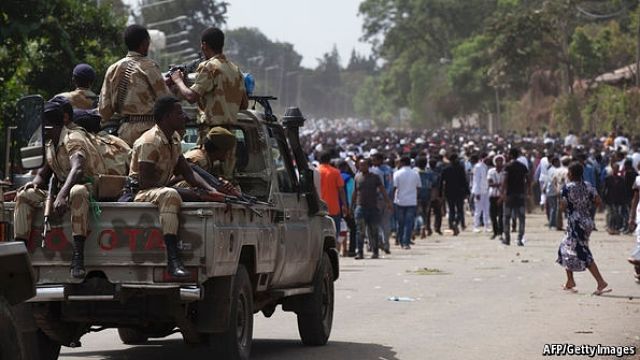 (Getty Images)
(Getty Images)
The old model persists: development now, democracy later
AMBO — THE three-hour bus-ride to Ambo from Addis Ababa, Ethiopia’s capital, offers a glimpse into the country’s future. The road is well paved; irrigation ditches and polytunnels criss-cross commercial farmland; electricity lines leap over forested hills. The signal granting access to mobile internet is clear and constant. As the bus pulls into Ambo, a trading centre in Oromia, the largest and most populous of Ethiopia’s nine ethnically based regions, the street is bustling.
But there are signs, too, that not all is well. An army truck rolls down the main road. Federal police surround the entrance to the local university. Unemployed young men playing snooker in bar point at a building across the road: it used to be a bank, but it was burnt down. Three years ago 17 local boys were shot dead by security guards as they protested on the doorstep, the young men say.
Ambo has a reputation for dissent. It was on these streets that protests against authoritarian rule started in 2014 before sweeping across the country. They culminated in the declaration of a six-month state of emergency on October 9th last year.
Students from Ambo University led the charge in opposing a since-shelved plan to expand the capital city into surrounding farmland. Oromo identity is especially powerful here: locals speak angrily about being pushed aside by ethnic Tigrayans, who they say dominate the government despite making up less than 6% of the population.
The country’s leading opposition politician, Merera Gudina—who was charged with inciting terrorism in February and was scheduled to appear in the dock on April 24th—comes from this area. When the ruling Ethiopian People’s Revolutionary Democratic Front (EPRDF) extended the emergency law for another four months (albeit after watering down its most draconian provisions) on March 30th, it was because of places like Ambo. Hundreds of its citizens have been arrested and subjected to months of “re-education” in military camps. Although stability has more or less returned to Ethiopia there are still young men across Oromia and Amhara, the second-largest region, who talk of protesting once more when the state of emergency is eventually lifted.
Not everyone feels this way. There may have been plenty of raised eyebrows when the prime minister, Hailemariam Desalegn, told Parliament on March 15th that 82% of Ethiopians wanted the state of emergency extended.
—
Join the conversation on Twitter and Facebook.

























